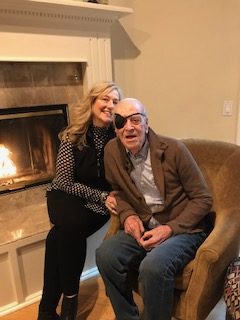Dear Reader — It’s been a year since the loss of my father and (eleven days later) my sister-in-law. In remembrance, I’m posting this (shortened version, previously only sent to Subscribers) on my site.
“No one ever told me that grief felt so like fear. . . the same fluttering in the stomach, the same restlessness, the yawning. I keep on swallowing. At other times it feels like being mildly drunk, or concussed. There is a sort of invisible blanket between the world and me. . . “ ~ C.S. Lewis
“Write a piece on grief this week,” my writing coach urged. She felt it would be cathartic for me since I’d experienced the death of two family members in one month. “I’m thinking about it,” I replied. I’d been thinking about it for two months. Then, without warning, her own father collapsed on a Sunday afternoon in his apartment complex hallway—by Monday afternoon he was gone. Now we were both members of the No Parents Club, our lifetime initiations occurring only four months apart. I recalled the many friends who had lost parents this past year and felt even more compelled to write about grief, yet couldn’t seem to get anything on the page.
Author Allison Fallon believes where we get stuck in our writing is where we get stuck in our lives—“not because we don’t know what to write, it’s because there’s something we want to say that we feel we can’t say.” And she nailed it—that was my entire problem. Writing about my mom’s death flowed, but Dad’s death was entirely different—it gnawed at me, haunting my sleep. Why?
I wasn’t there for it.
While I’d cared for Mom in my own home, sitting bedside as she crossed into her afterlife, I could not offer the same for my dad. The Covid lockdown shut down his facility to visitors, leaving me standing at the door holding Costco-sized containers of cashews and pork rinds. He stood outside his door and waved from the end of the hall, a big smile on his face.
That was the last time I saw his smile in person. He contracted Covid, and a subsequent CT scan at the local hospital revealed lung cancer. They released him, stating they didn’t know how much time he had.
Dad returned to the facility, where he was settled back into his room. I FaceTimed with him, called endlessly, begged for special dispensation. They might allow a deathbed visit with proper PPE. Should I go? Today? Tomorrow? I agonized about this, wanting to be by his side but fearful I would bring Covid home to those in my household who may be high risk. My daughter, who works at a Level 1 Trauma hospital in the Bay area, told me in no uncertain terms that I should not go. “There are people who come in to sit a bedside vigil, only to contract Covid, take it home, and kill one of their other family members.”
I sat alone in my bedroom in tears, awaiting a call from the doctor.
“I’m here,” I said to no one.
You might be wondering why alone, since I have a supportive family and close friends?
Part of me wanted to be alone with my grief. I am, after all, rooted in a culture which author Francis Weller believes “expects us to carry grief as a solitary burden—American culture sends the message ‘Get over it. Get back to work’”. He challenges us to think about how much energy we expend trying to deny these parts of ourselves.
Other cultures deal with loss so much better. The Lakota Tribe express grief through crying and wailing, singing, cutting their hair. They believe when a person suffers great loss, this is when they are most holy. Think about that. Is there ever a more vulnerable time for a human than in the face of deep and grave loss, where every trapping and mask is ripped away? The Lakota people beg the aggrieved to pray for them at this time, believing their prayers hold special powers. Perhaps they do.
Dad passed away at 7:40 p.m. on a warm September evening, while sleeping comfortably. I’m grateful he didn’t suffer, or endure a lengthy illness.
Francis Weller, author of The Wild Edge of Sorrow: Rituals of Renewal and the Sacred Work of Grief, says “Friendship is perhaps the most essential tool we have in times of loss. For thousands of years we were nourished by being members of a community, gathering around the fire, hearing stories of the elders, feeling supported during times of loss and grief, offering gratitude, singing together, sharing meals at night and our dreams in the morning.”
If you’re still reading, thank you for hanging in there. To those who have been my community, who have literally “gathered around my fire,” it will not be forgotten. Further, writing this has done something positive for my psyche: it has given shape to my loss.
There is power in the written word.
There is power in the spoken word.
That’s why PTSD sufferers are asked to talk about it, not to hold it in—when words are breathed out into the open space, their heavy hold dissipates. Others who hear those words come alongside you, helping you embrace the freedom that is imminent in the release of your burden.
This past year has been a year of loss for so many, and not just from death. Collectively, we have suffered loss of good health, loss of a job or financial security, even loss of the world as we once knew it. Know this: you are not alone in your journey. There are those who wish to walk alongside you. Weller sums it up well when he says “There’s no way to be spared sorrow. I wouldn’t even wish that upon someone. But we shouldn’t get stuck in our grief; it’s not a permanent address but a companion that walks beside us. Everything I love, I will lose. That’s the harsh truth. You either have to shut down your heart—and miss the love that is around you—or wrestle with that truth and come out the other end.”
Please forward this email to someone who needs to read these words on grief. I’d love to hear from you, and how you have dealt with losses in your own life.
Wishing you every good thing,
Suzette
To make sure you keep getting these emails, please add suzette@suzettemarling.com to your address book or whitelist us.


What a beautiful sentiment!
It has been a rough few years in terms of loss. This accurately described some of the things I’m feeling and encouraged me to write about it! I’ve been holding it all in but it’s time to let it out!
Writing about it absolutely helps! I’d love to see your results. 🙂
Thanks for the reminder Hugs
Still fresh in our hearts and minds a year later. Hope you are well!
Such wisdom only comes from those who walk the dark paths. Thank you for this
Thank you, Anita. And you know that one as well….hugs to you, my friend.